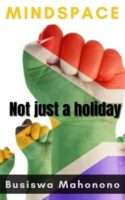My grandfather grew up during the apartheid era. I remember one day helping him with some documents and saw that he still had his dompasi. He picked it up and said, “This was a lifeline for so long that the idea of getting rid of it was never in my mind. Not because I thought I would be here today telling my grandchildren about it but because during that time the idea of us getting freedom sounded like a joke. I felt like if I got rid of it today, what if apartheid came back tomorrow.”
That whole conversation stayed with me. My grandfather is a man of few words. He wakes up every day at 4 am to get ready for the day. By 5 am all the animals of the yard are out and about, with him as the shepherd. When I stayed with him, every day before he started work, I had to make him his morning tea. In many ways him and I are similar; most of the traits I have today I got from him because I was raised and taught by him. One thing though he never wanted to talk about was his time during apartheid.
Till this day the only conversation he has ever had with his grandchildren about that time was the one on that day we found the dompasi. He experienced a lot of loss during that time; his father was killed and some of his friends were killed. When I was younger, Human Rights Day to me was a public holiday; now that I am older, I am realising my privileges. What I have noticed with my granddad is how even after almost 30 years, in his mind he is still stuck in the apartheid era. The rights we speak of today, which he was part of the struggle for, he really hasn’t enjoyed much.
Also, in the same token, when I look at the younger generation of kids, even younger than myself, I realise we are living in our ancestors’ dreams. My nine-year-old sister one day asked, “Busiswa wawuphi when Nelson Mandela died?” she wanted to know where I was when Madiba died because to her he sounds like a historical figure from 90 years ago. While for me, I remember 2013 vividly; I didn’t know then that moment will be a fascinating story to share. I didn’t know admitting I was alive during the same time as Nelson Mandela was a flex – until Gen Z arrived, of course.
It made me understand my grandfather a bit more. The racism I have to endure now as his grandchild is not as blatant as what he experienced, but I am also living on the aftermaths of his time and I have to explain my time to the ones after me. Not because it’s a beautiful thing to share but because I must remind them, in the same way my grandfather reminds me, that it’s not just history. It may be written in books now, but it will always be reality. Every Human Rights day is always about the fanfare of what happened and the historical heroes that fought during that time, but never really about the ordinary people who were also affected. Imagine after so many years, with a wife, children, grandchildren and great grandchildren you are still locked in mental fear that your rights to freedom may be taken away. Again.
That is a type of trauma that this generation will never understand; which is why it’s so easy for us to criticise and overlook the fight to freedom the older generation had to go through. When I talk to my grandfather about my political standings and my views on democracy he simply always reminds me: “Before 1994, black people didn’t even have the right to vote let alone the privilege to voice out their ideologies so freely.”
My 15-year-old neighbour explained what Human Rights Day means to her. She said, “I think with so much freedom we tend to forget that people had to fight for it. Today it sounds ridiculous that you had to fight for rights to exist, because we take it so much for granted, but our people did and for that I will always be thankful.”
Looking back, so much has changed; also so much hasn’t, but I think the public holiday exists so we can celebrate what has changed. The pain, the loss and the trauma that our ancestors who fought for us experienced, was worth it in the end; so that today black people can express themselves freely. For me the day means people like my grandad have a chance to be acknowledged by their own; a chance for us to tell them that no matter how long time passes we will never forget their sacrifices.
If you enjoyed this, you may like reading Human Rights are for everyone here
Tell us: Do you have grandparents who are still alive who talk to you about their experiences during apartheid?



